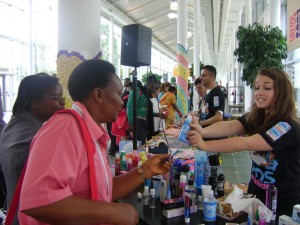What’s your flavour? A look into female condoms
Friday, July 23rd, 2010 by Fungai Machirori
Pina colada and berry flavoured vaginal lubricant.
Green apple-scented condoms.
These are just but a few of the enticements featured at the Condom Project stall at this year’s 18th International AIDS Conference, which opened on Sunday. The organisation, which is part of the larger Condomise Campaign, boasts a stall with an array of colourful condoms, genital lubricants and other aids which the general public are free to sample and taste.
But amid the kaleidoscope colours of sensuality and allure, the female condom still looks unappealing in its white, pink and blue packaging.
As Joy Lynn Alegarres, the Director of Global Operations for the Condom Project, explains, the FC2 female condom, the only condom currently approved for global use, is undergoing a rebranding (through partners such as UNFPA)and will soon reflect the identity of the various countries where women use it.
“In Bali, the packaging is now pink with a flower on it,” explains Alegarres.
As Maya Gokul of South Africa observes, the female condom is available in over 120 countries of the world and has passed tests of approval from the US Food and Drug Administration (FDA) and the World Health Organization (WHO).
And it can be sexy.
“Since the inner ring is detachable, it is exciting for guys,” adds Gokul. “When the penis bumps against that inner ring it is very sensual.”
She also added that a male partner can use the inner ring to arouse the woman through playing with her clitoris prior to putting the condom on.
And as Nienke Blauw of the Netherlands demonstrated, there are newer models of the female condom that may soon be on the market that can add to the variety for the female condom. One condom, which is called the cupid and is being developed in India, has a sponge instead of an inner ring which is meant to gave a different sensual experience to the user. Another is cone-shaped and has a tampon-like tip which expands to fit into the inner vaginal lining upon contact with moisture. Unlike other female condoms, it does not use lubricant as it makes use of the woman’s fluids to eventually open up after insertion.
But while innovation around the female condom is increasing, barriers still exist.
“In Zambia, female condoms are going for a (United States) dollar for a pack of two,” explained Carol Nyirenda of the Coalition of Zambian Women Living with HIV.
Prices of female condoms remain much higher than those of male condoms, which means that many women cannot afford to buy the only HIV prevention device that they can control themselves.
Currently, Zambia’s activists are in the process of lobbying the Ministry of Trade and Industry to review and formulate policy for the regulation of the quality of privately imported male and female condoms by 2011.
Also, Nyirenda stressed the importance of educating those who use the condom to do so correctly and consistently, and also to challenge cultural norms that increase women’s vulnerability to HIV transmission, such as marital rape.
“There is need to work on cultural norms which promote the subordination of women, especially in terms of sex, notes Tabona Shoko,the Director of Zimbabwe’s National Network of People Living with HIV and AIDS (ZNNP+), who is an advocate for the female condom. “We need to create leeway for women to negotiate for safer sex.”
Interestingly, Annie Michelle Salla of Cameroon shared that in her country, male military officials had actually requested that rather than train them to use the male condom effectively, they requested that condom promoters train their wives to use the female condom.
The reason?
The men felt that it was important for their spouses to be able to protect themselves since they admitted that they were not responsible enough to do so.
Roli Mahajan, a journalist from India also feels strongly that the female condom should become more widely available and affordable. But when asked how it could be improved, she admitted to never having used it.
Veanne Turczynski from Germany has also never used the female condom but is sceptical about the product. “I cannot imagine that it’s practical to use because it’s hard to handle,” she noted. “It’s so much more complicated than the male condom.”
But with an HIV epidemic that still affects far more woman than men, the female condom remains a tool well worth investing in – for the sake of women’s health.









